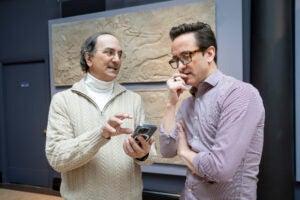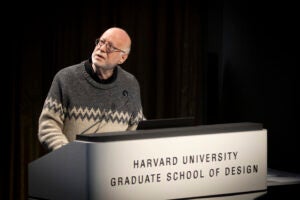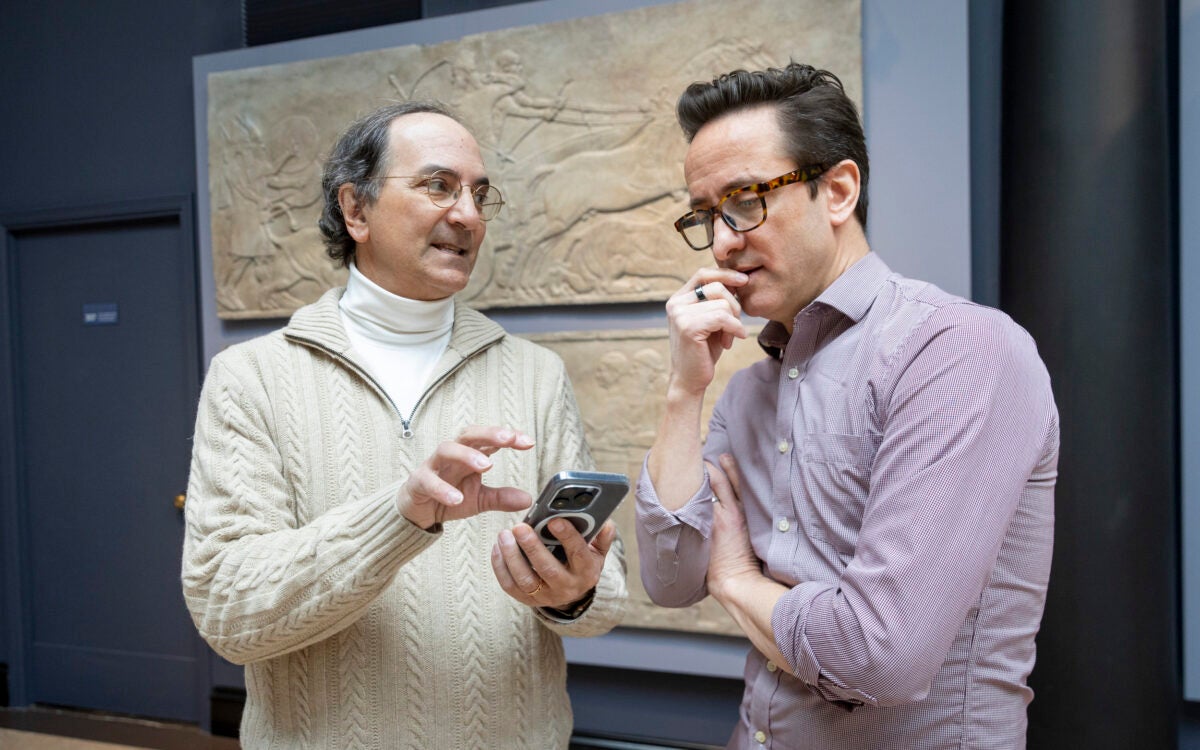Stephanie Mitchell/Harvard News Office
Paulus reaches beyond boards
A.R.T. director says, ‘theater is more than just the play on the stage’
Clad in black and white, her brown hair loose about her shoulders, her green eyes intense, Diane Paulus sits in her office and smiles. Against the window rests a stolen treasure from her days as a Harvard freshman, a poster of the American Repertory Theater’s (A.R.T.) production of Samuel Beckett’s “Endgame.”
“This is really an amazing full circle for me and a dream come true. I have to pinch myself occasionally.”
The New York native is still incredulous that she now occupies the office of the man she once interviewed for her senior thesis about an experimental theater group from the 1960s. She confesses to having stalked the company’s hallways in her undergraduate days, occasionally swiping a memento or two for her dorm room (thus, the “Endgame” poster). The A.R.T., she admits, is in her DNA.
As the organization’s new artistic director, the diminutive Paulus ’88 brings provocative programming and a force-of-nature personality to the post.
“She is full of beans and energy and excitement and exciting ideas. She’s an electrifying person,” said Robert Brustein, the A.R.T.’s founding director. “The program is going to be very different than it has been at the A.R.T. We welcome the difference, and I think the audience will be very pleased.”
The Phi Beta Kappa alumna is known for her kinetic productions that often cross traditional plays and operas with pop culture, and occasionally even invite the audience to become part of the show. In a press conference at the theater last week (April 15), Paulus unveiled her plans for her inaugural season, one that will take on several classics with modern twists, and introduce a variety of new productions. Her goal, she said, in keeping with the A.R.T.’s mission, is to “expand the boundaries of theater.”
“I think perhaps arts producers need to look a little closer at what we are providing in the arts experience, and I say ‘arts experience’ quite purposefully because my belief is that the theater is more than just the play on the stage. I believe very much in the theatrical event and how that can be newly defined.”
Paulus has divided the season into three festivals each with a particular theme, an effort to make the shows into “cultural events” and bring, as she puts it, a greater “synergy” to each series of productions.
“Shakespeare Exploded!” is a selection of works by the Bard, including Paulus’ “The Donkey Show,” a collaboration with her husband, Randy Weiner, that explores “A Midsummer Night’s Dream” through the lens of the infamously self-indulgent disco Studio 54. Staged at the Zero Arrow Theater, the space will be transformed into a version of the popular New York nightclub from the 1970s, with the audience encouraged to get into the act. “Sleep No More,” recasts “Macbeth,” as an immersive theater experience, one where the audience can wander a Hitchcock-inspired cinematic installation. For the retelling of “The Winter’s Tale,” Paulus will enlist the help of local gospel choirs and R&B to recount the story of jealousy and forgiveness.
The “America: Boom, Bust, and Baseball” festival explores some of the highs and lows in America during the past century. “Gatz Parts 1&2” takes the audience through an entire theatricalized reading of Fitzgerald’s “The Great Gatsby” (seven and a half hours to be exact), while “Paradise Lost” examines a family struggling in the Great Depression. The third show in the series, the musical “Red Sox Nation,” unravels the most notorious curse in baseball.
The final festival, “Emerging America,” a collaboration with the Institute of Contemporary Art and the Huntington Theatre Company, will introduce a number of new artists and their works.
The arts are in the blood of the 42-year-old Paulus, who grew up in Manhattan — two blocks from Lincoln Center — where she studied ballet, classical piano, and theater. As a young dancer with the New York City Ballet, Paulus watched from the wings as famed choreographer George Balanchine wove his magic. Onstage, she danced with Baryshnikov.
Though she ultimately opted for Harvard over Juilliard, her artistic impulse never faded. Initially interested in politics, her experience with the A.R.T. and the Harvard Undergraduate Drama Club, where she was involved with theater “every waking moment,” helped guide her to a life of the stage.
“I definitely feel it was this seminal moment of seeing professional theater done in such a stunning way, of having this professional institution show you what was possible.”
Paulus graduated with a degree in social studies and later earned her M.F.A. in directing from Columbia University’s School of the Arts. Soon she was producing shows with her husband and their small theater group, Project 400. A freelance director for the past several years, Paulus’ recent work includes the current Broadway revival of “Hair”; “Kiss Me Kate” at Glimmerglass Opera; and “Lost Highway,” an English National Opera (ENO) co-production with the Young Vic in London, based on the David Lynch film.
Engaging with the Harvard community in new and creative ways is a critical part of her role, said Paulus. Others agree. That central philosophy, noted Provost Steven E. Hyman, who chaired the search committee, was essential in her selection.
“Diane … is absolutely committed to this,” said Hyman. “I believe that the kind of communal experiences centered on art that are provided by live theater can be transformative for communities like ours.”
Paulus is already making good on her promise. She recently invited a group of undergraduates to her Broadway production of “Hair” and is collaborating with Marjorie Garber, William R. Kenan Jr. Professor of English and of Visual and Environmental Studies and director of the Carpenter Center, on a Shakespeare course in the fall based on the A.R.T. Shakespeare festival. Paulus also hopes to be an active participant in the current discussions on creating a theater major in the College’s curriculum.
For Paulus, the potential to engage the Harvard community — as well as the broader community — with her vision of the theater is invigorating.
“I’m just obsessed,” she said, “with revitalizing the audience’s present engagement with theater.”




